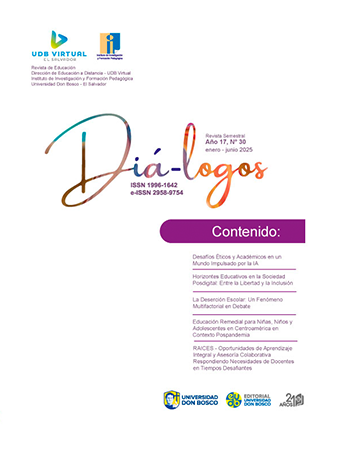Remedial Education for Children and Adolescents in Central America in a Postpandemic Context
DOI:
https://doi.org/10.61604/dl.v16i30.441Keywords:
Remedial education, compensatory education, educational strategies, educational programsAbstract
The COVID-19 pandemic has triggered a profound economic and social crisis across Latin America and the Caribbean, significantly affecting the population's well-being and creating devastating and often overlooked consequences in the educational sector. These effects have further deepened pre-existing disparities in the region (Huepe et al., 2022). To address the educational crisis, tutoring and academic support have been proposed as key tools to rebuild cognitive and socioemotional skills lost during the confinement period (UNESCO, Banco Mundial, y UNICEF, 2021).
In response to this, Glasswing International, an organization dedicated to children and youth, implemented a remedial education project titled “Rebuilding and Strengthening: Socioemotional and Remedial Support for Students and Teachers” with 2,599 students from third to sixth grade in Guatemala, Honduras, and Nicaragua. The project employed the Teaching at the Right Level (TaRL) methodology, adapted by the Independent Learning Assessment Program (MIA), to strengthen basic literacy and numeracy skills in centroamerican students.
Pre- and post-intervention diagnostic results revealed that 80% of the participating students achieved the expected level or improved their academic abilities. Qualitative evaluations conducted with 48 community education stakeholders further highlighted that the project not only contributed to academic skill development but also enhanced social and intrapersonal skills. These findings underscore the effectiveness of the TaRL approach in mitigating the negative educational impacts of the pandemic within the Central American context.
Downloads
References
Banco Mundial (2020). COVID-19: Impacto en la educación y respuestas de política pública. [Archivo PDF]. https://pubdocs.worldbank.org/en/454741593524928204/Covid-19-Education-Summary-esp.pdf
Banco Mundial, Fondo de las Naciones Unidas para la Infancia (UNICEF) y Organización de las Naciones Unidas para la Educación, la Ciencia y la Cultura (UNESCO). (2022). Dos años después. Salvando a una generación. [Archivo PDF]. www.unicef.org/lac/media/35631/file/Dos-anos-despues-salvando-a-unageneracion.pdf
Block, J. H. (1971). Mastery learning: Theory and practice. Holt, Rinehart and Winston Inc. https://gwern.net/doc/psychology/1971-blockmasterylearningtheoryandpractice.pdf
Centro de Investigación Avanzada en Educación de la Universidad de Chile (CIAE); y Fondo de las Naciones Unidas para la Infancia (UNICEF). (2023). Buenas experiencias para la recuperación de las brechas de aprendizajes y del bienestar socioemocional en tiempos de pandemia. [Archivo PDF]. www.unicef.org/chile/media/8681/file/buenas%20experiencias.pdf
Fondo de las naciones unidas para la infancia (UNICEF). (2023). Lecciones aprendidas de la Enseñanza al Nivel Adecuado: Campamentos MIA. [Archivo PDF]. https://pdf.usaid.gov/pdf_docs/PA00TCP8.pdf
Huepe, M., Palma, A., y Trucco, D. (2022). Educación en tiempos de pandemia: una oportunidad para transformar los sistemas educativos en América Latina y el Caribe. Serie Políticas Sociales, 243. https://repositorio.cepal.org/server/api/core/bitstreams/e66c7b0e-41da-4a4abe97-543097fccfb1/content
Instituto Internacional de Planeamiento de la Educación (IIPE), Campaña Latinoamericana por el Derecho a la Educación (CLADE), y Comité de Oxford de Ayuda contra el Hambre (OXFAM). (2021). Desigualdades educativas en América Latina: tendencias, políticas y desafíos. [Archivo PDF]. https://redclade.org/wp-content/uploads/CLADE_AmerLatina_Educ-y-Desiguald_v4.pdf
Medición Independiente del Aprendizaje (MIA). (2022). Instrumentos. https://www.medicionmia.org.mx/instrumentos
Organización de las Naciones Unidas (ONU). (2020). Informe de políticas: La educación durante la COVID-19 y después de ella. [Archivo PDF]. www.un.org/sites/un2.un.org/files/2020/09/policy_brief_-_education_during_covid-19_and_beyond_spanish.pdf
Organización de las Naciones Unidas para la Educación, la Ciencia y la Cultura (UNESCO), Banco Mundial y Fondo de las Naciones Unidas para la Infancia (UNICEF). (2021). Misión: recuperar la educación 2021. [Archivo PDF]. https://www.unicef.org/media/98876/file/Mission%20:%20Recovering%20Education%20in%202021.pdf%20UNESCO,%20UNICEF,%20BM
Pratham. (s.f). Teaching at The Right Level.https://www.pratham.org/about/teaching at-the-right-level/
Slavin, Robert. E. (2014). Educational Psychology Theory and Practice. Pearson New International Edition. [Archivo PDF]. https://api.pageplace.de/preview/DT0400.9781292033983_A24576160/preview-9781292033983_A24576160.pdf
Downloads
Published
How to Cite
Issue
Section
License

This work is licensed under a Creative Commons Attribution-NonCommercial-NoDerivatives 4.0 International License.









